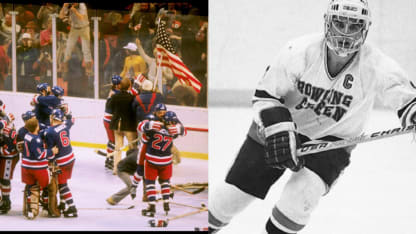It was one of the most important nights of his life.
And he wasn't even there for it.
On February 22, 1980, a chilly, late-winter Friday, two scenes played out 800 miles apart that had an everlasting impact on Golden Knights general manager George McPhee.
The first was a college hockey game in Marquette, Mich., where McPhee was a sophomore scoring star for the Bowling Green Falcons in an otherwise forgettable game against Northern Michigan University.
His team won 7-5, for whatever it's worth.
The other was a game - the game of all games - at the 1980 Olympics featuring the United States and the Soviet Union.
George McPhee Remembers 'Miracle' Anniversary Fondly
Then a 21-year-old Canadian in U.S. college, the events of the 1980 Olympics helped give McPhee a chance in the NHL

By
Dan Marrazza @GoldenKnights / VegasGoldenKnights.com
RELATED: Get tickets to see the Golden Knights
The Miracle on Ice.
Perhaps you've heard of it?
Watch: Youtube Video
For most Americans, the Miracle on Ice is the story of when a plucky bunch of American college kids shocked the Soviets in what was perhaps the most stunning sports upset of the 20th century.
RELATED: What was George McPhee like in college?
For McPhee, then a 21-year-old Canadian, that night was one that forever altered the path of his hockey career.
"There was an announcement during our game," McPhee said. They made an announcement during the game, and we were stunned. It was such a stunning moment in any hockey player's life.
"I'll never forget it. Stunning"
What made the night so transformative for McPhee was the number of parallel storylines that were at work.
On one hand, two of McPhee's former teammates at Bowling Green, defenseman Ken Morrow and center Mark Wells, were part of the U.S. team that surprised the Soviets and then Finland two days later (37 years ago today) to win gold medals at Lake Placid.
On the other hand, McPhee was a standout collegiate scorer at the time, and two years later even won the Hobey Baker Award as NCAA's top player. But in an era that emphasized big, rugged players that paid their dues in the Canadian Hockey League, the thought that a 5-foot-9, undrafted college player like McPhee could reach the NHL was almost unfathomable.
RELATED: George McPhee: Fun Facts
In fact, it was virtually impossible. It was for almost all collegiate players back then.
That is until events in Lake Placid he wasn't even there for changed the outlook for McPhee's career, and life.
You could even argue that McPhee wouldn't be the Golden Knights general manager in 2017 had it not been for the new opportunities that were created for him thanks to the U.S. team's success at the 1980 Olympics.
"It was a really enlightening experience," McPhee said. "As young players, everyone wanted to play in the NHL someday. We fantasized about that. We could see all these players we had played against. (Ken) Morrow and (Mark) Wells we played with (in the Olympics). We played against (Neal) Broten, (Bill) Baker and all of these other guys.
"When they got beat by the Russians at Madison Square Garden (three days before the Olympics), what was the score, 10-3? I guess it could've been even worse. It was really hard to reconcile that as a college player because we thought that these players representing the U.S. were really good players. And they had played together all year. And they're getting beaten 'that bad.' We're thinking the Russians must be unbelievable. And we're never going to get the chance to play at that level.
RELATED: Bryce Harper proud to support Golden Knights
"Then things changed. Those players end up winning the tournament, and gave a lot of us still playing in college hope.
"It did an amazing thing for the U.S., and really opened the door for other college players to get chances to play in the NHL. Suddenly, there was much more attention paid to college players and free agents."
For McPhee, the timing couldn't have been more ideal.
With two more years remaining in college at the time of the U.S. team's 1980 Olympic victory, he had ample opportunity to be seen by NHL scouts after "Lake Placid Effect" reached NHL front offices.
Which where the outlook on his hockey career may have otherwise been bleak, he parlayed his gaudy college stats (80 points in 40 games as a senior) into an opportunity to join the New York Rangers in 1983.
Coincidentally, New York was where Miracle on Ice coaching heroes Herb Brooks and Craig Patrick were becoming pioneers at employing vast numbers of collegiate players on an NHL roster.
RELATED: Expansion Draft Primer: Who can teams protect?
"GMs and teams became very aggressive in signing college free agents," McPhee said. "In fact, the year I came out and signed with the Rangers (with Craig Patrick and Herb Brooks), one of the reasons I went to them was because I knew they wouldn't have the college bias that some of the other teams did. The Rangers signed 13 college free agents that year and put us all on the same team."
Although the Rangers fired Brooks in 1985, McPhee carved out an additional two years in New York before moving over to the New Jersey Devils to finish out his NHL career.
Which isn't to say that McPhee established himself as a star in the NHL, made a name for himself and lived happily ever after as a GM
Quite the contrary, in fact.
McPhee's NHL career was marked for his willingness to bust his butt and take on all comers, regardless of their size or pedigree, which was a far cry from his status as a scoring star in college. He scored 24 goals in 115 career NHL games.
But partially due to the 1980 Olympics, McPhee received a sliver of an opportunity to prove himself in the NHL where there otherwise may have been none.
RELATED: What positions must Vegas select in the Expansion Draft?
This gave him the chance to survive in the NHL long enough to form lasting relationships in front offices.
This is how after remaining in New Jersey to earn his law degree after his playing career ended in 1988-89, McPhee eventually launched his NHL managerial career in the early 1990s.
This is how he eventually rose through the ranks of the Vancouver Canucks and became the architect of several Stanley Cup-contending Washington Capitals teams.
In many ways, this is the start of the story of how McPhee became GM of the Golden Knights.
"That victory was a big turning point in recruiting, the signing of free agents and the drafting of college players," McPhee said.
"It just changed everything."


















